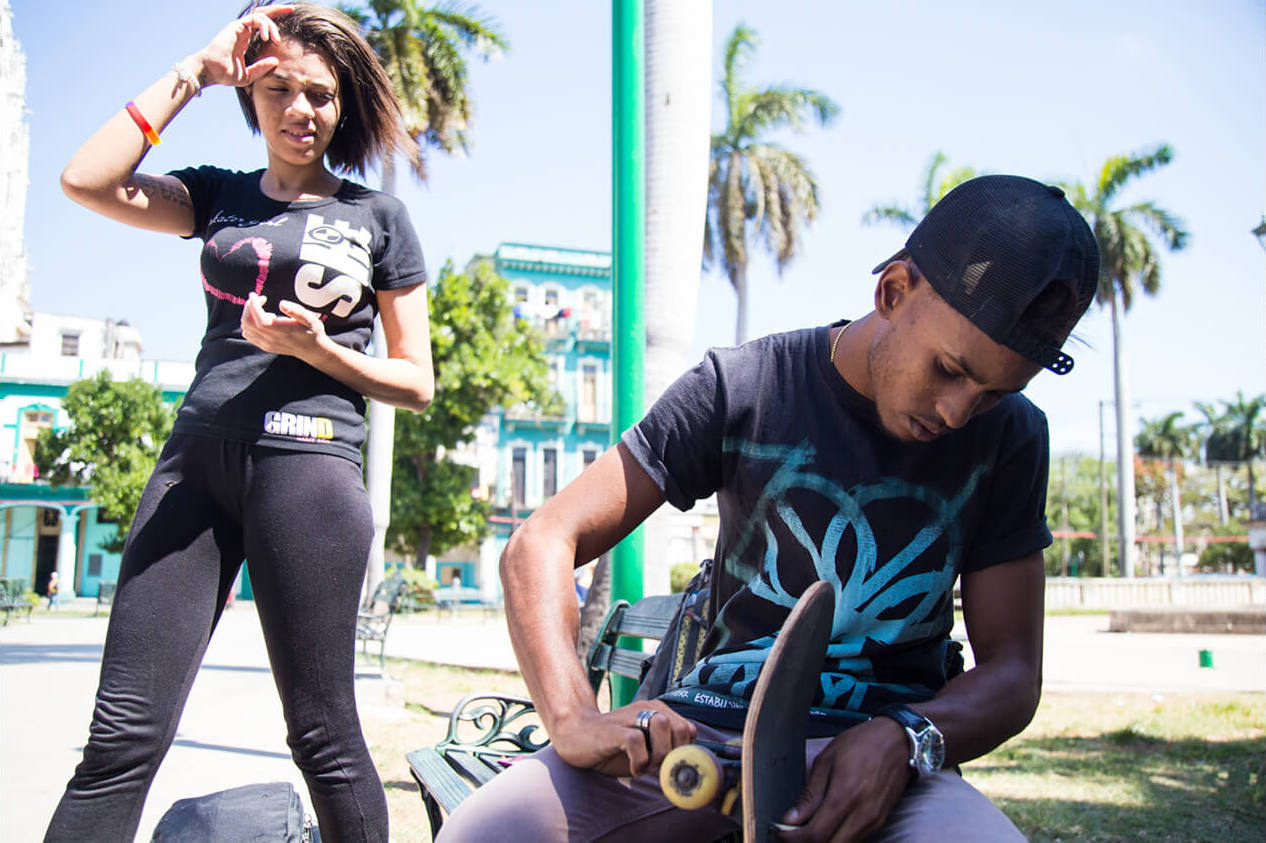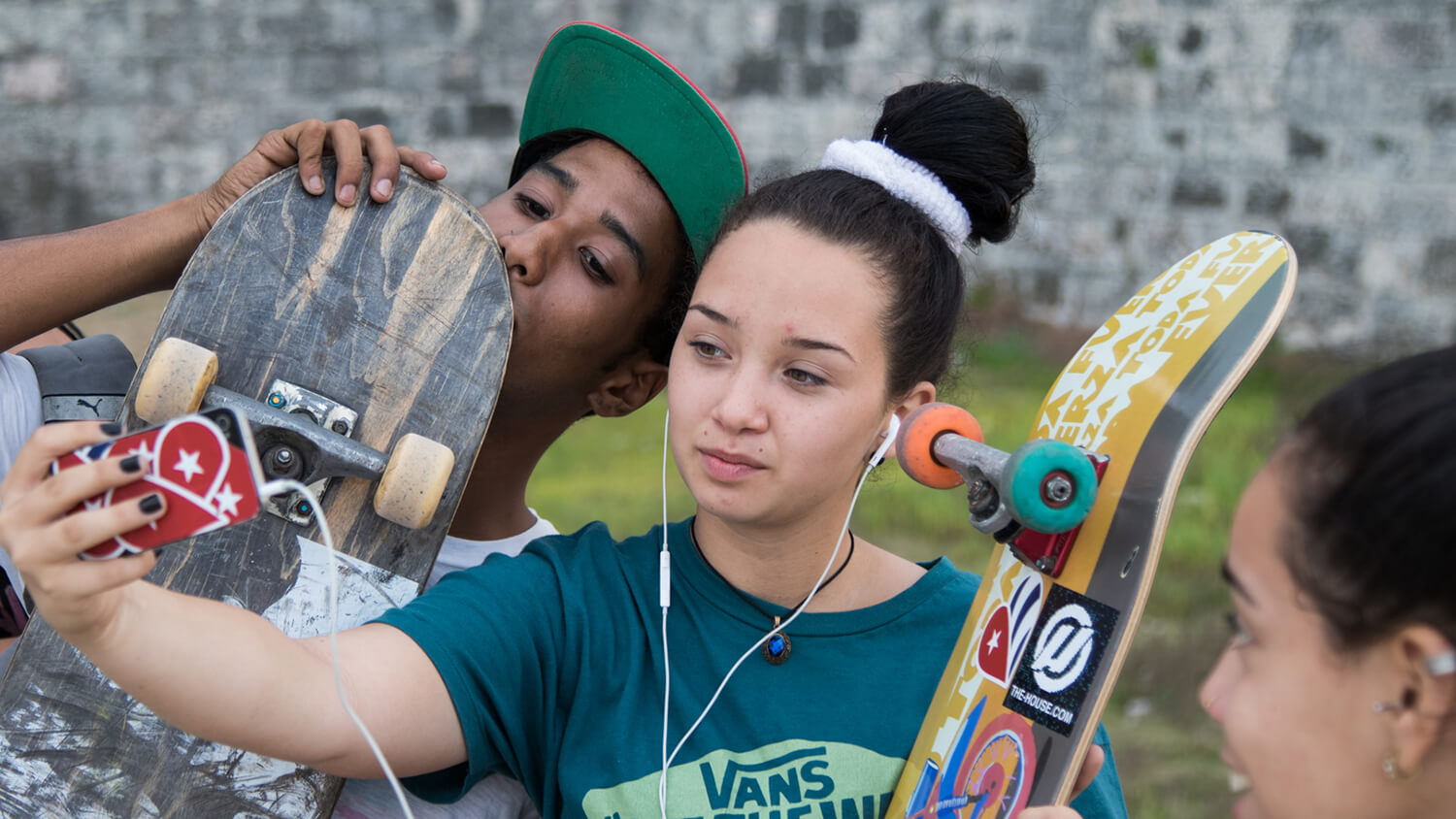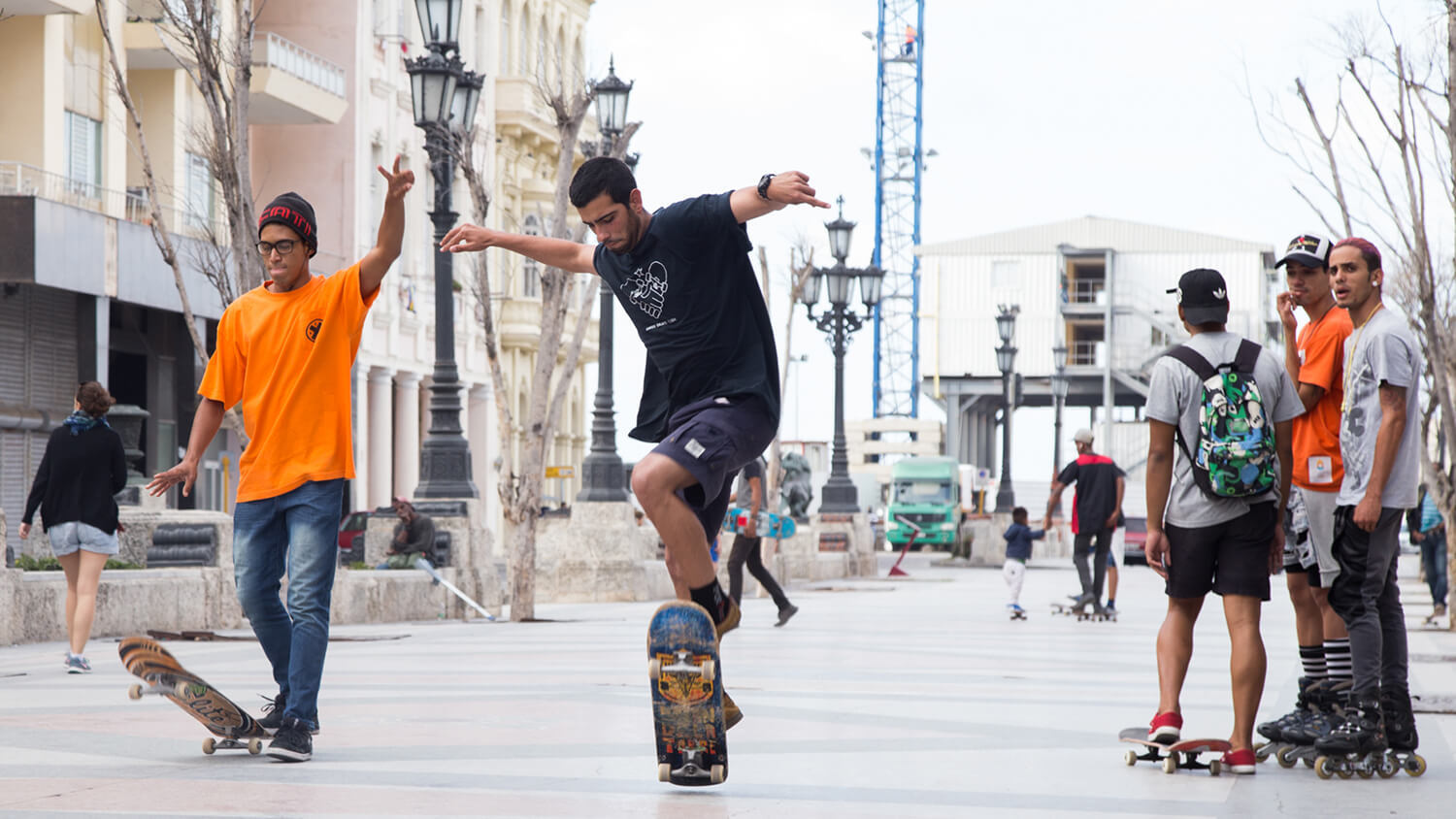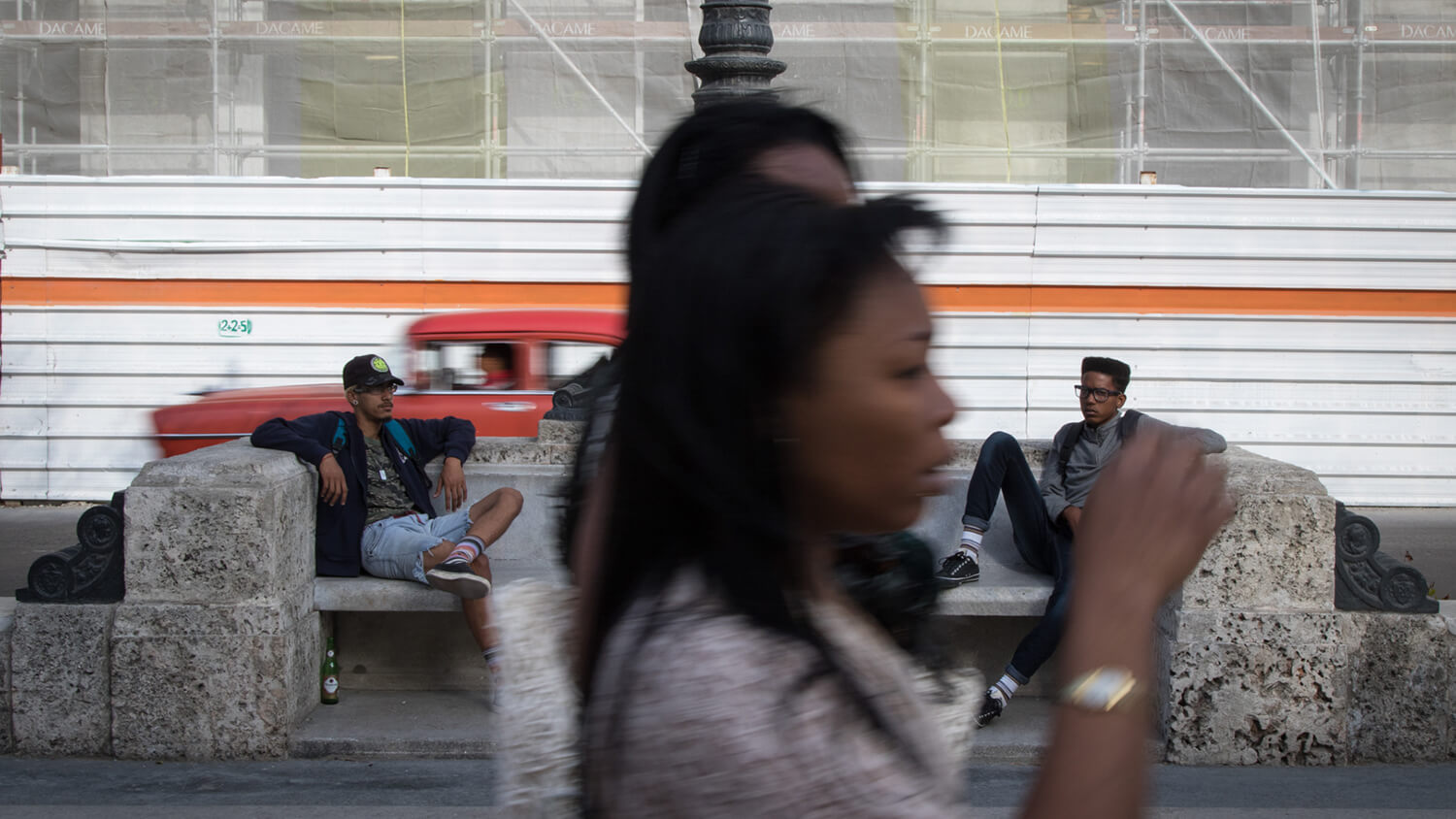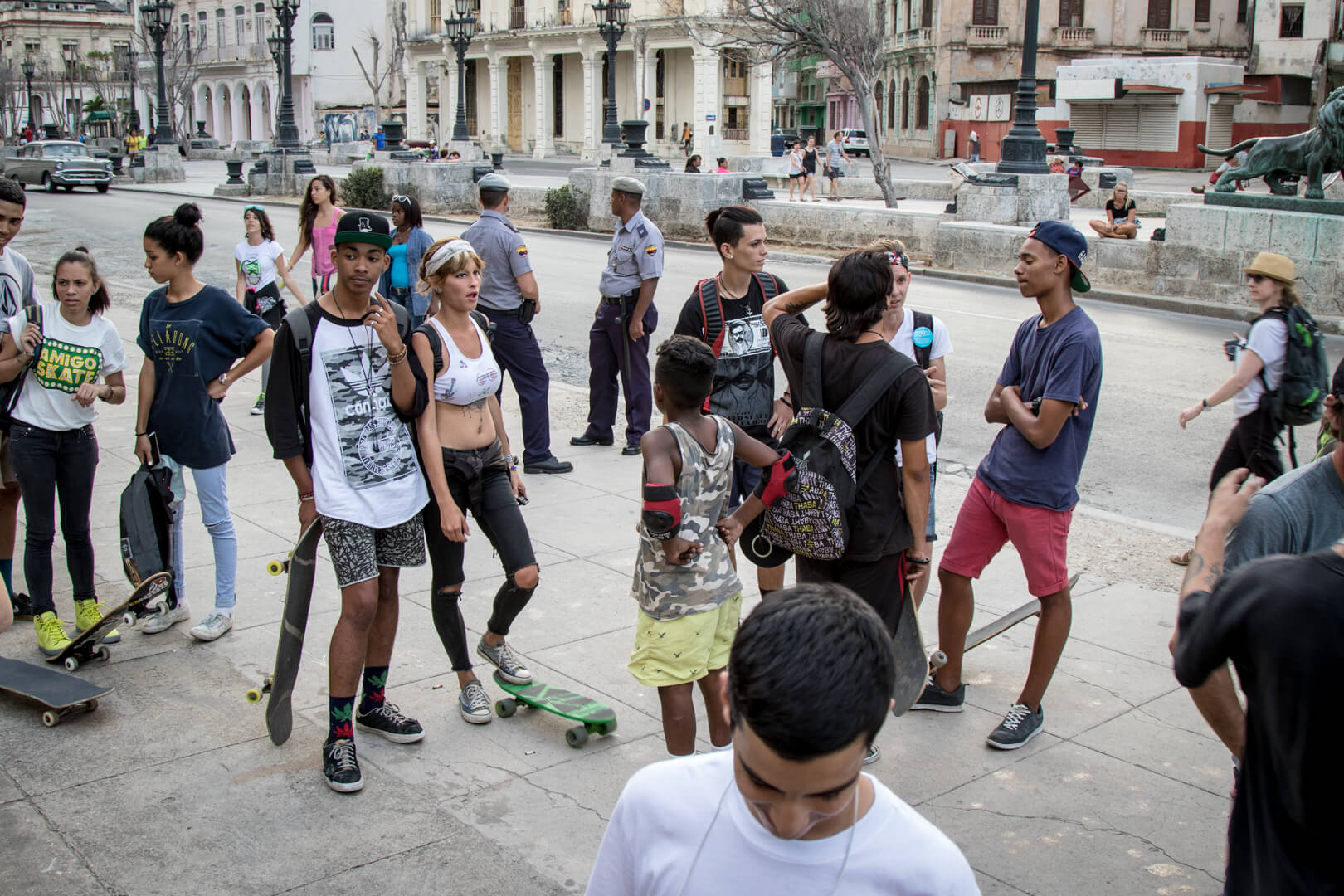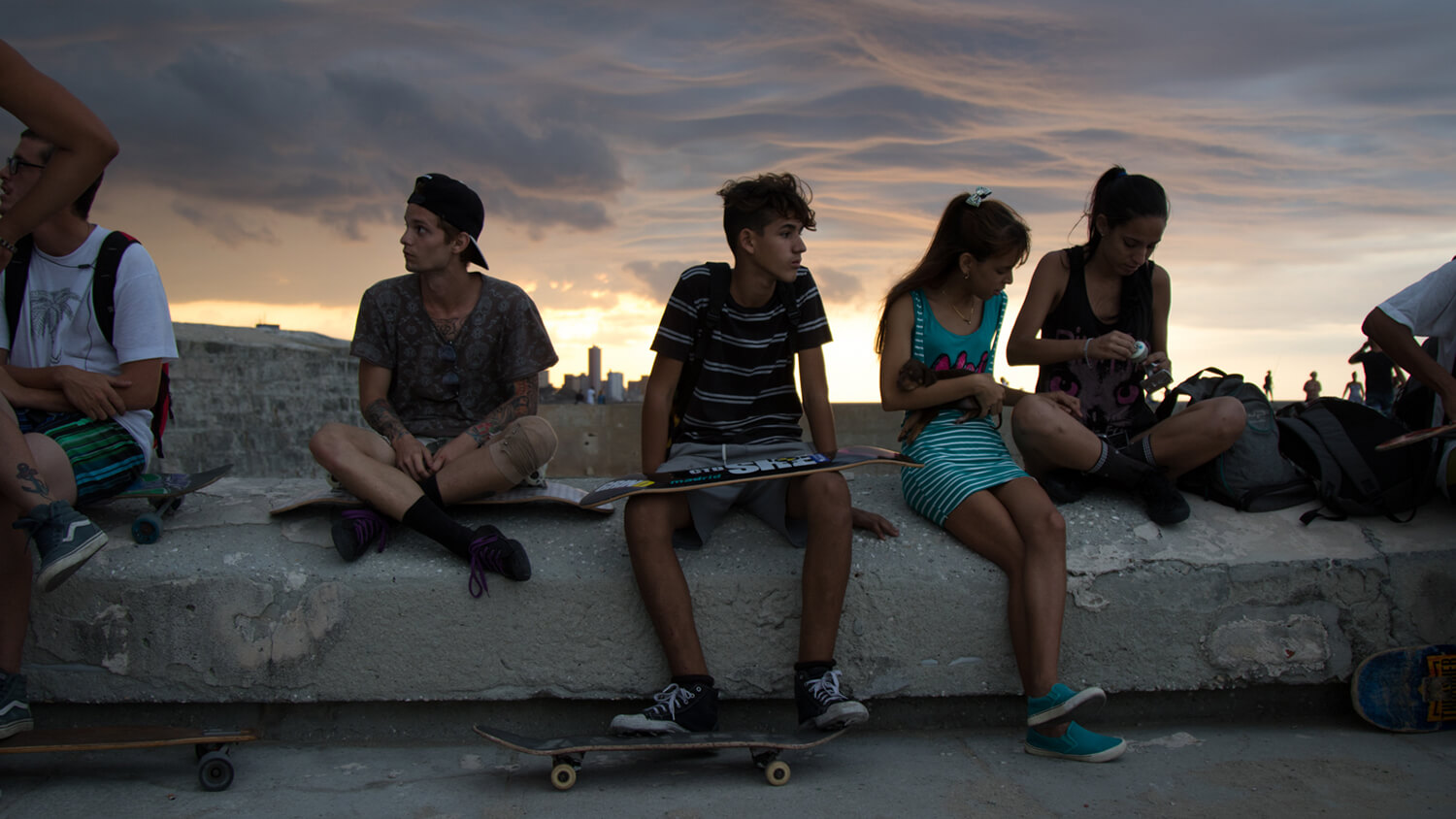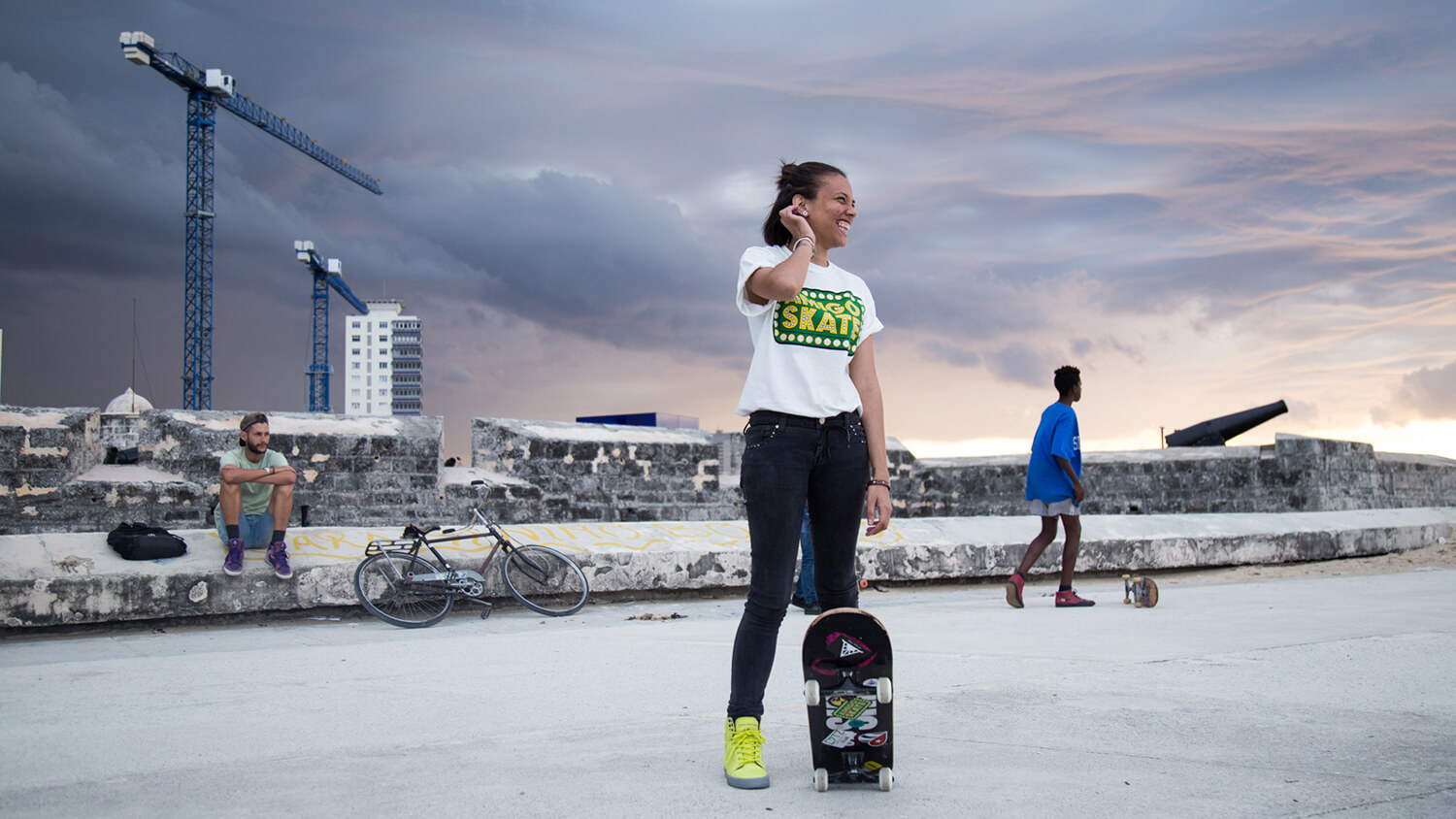Revolution on Wheels
Cuba’s youth refuse to be curbed by tradition
On a Sunday afternoon El Prado, the smooth, stone promenade that divides Old and Central Havana, is full of life. Painters line the walkway, dipping brushes into the bright yellows and blues that make their art Cuban in the eyes of tourists. Other craftsmen have set up tables and chairs in the middle of the promenade, where they carve small wooden statues. Parents and strangers crowd around as a 10-year-old boy lifts and twirls his dance partner – a small girl wearing flat ballet shoes, her hair in a tight bun. The air carries the timba beat – trombones, conga drums and the clap, clap, clap of the clave – along with the smell of the ocean toward the heart of the city.
A teenager on roller blades maneuvers through the dance performance, stopping at a bench crowded with tattooed teens sharing a cigarette. In Cuba, tattooing is illegal, but it’s not uncommon to see older teens with tattoos they got from a makeshift parlor hidden in a dilapidated Havana apartment. At their feet, skateboards scatter the ground. The sound of silicone wheels slapping the marble surface overwhelms the place as skaters land ollies and kickflips and toss their boards onto the hard floor. An 8-year-old boy skates up to a group of guys in their early 20’s and daps them up like old friends. Age doesn’t seem to be a discriminating factor here, and neither does style. Skaters in black share the street with those in Hawaiian shirts and gym shorts. Here, punk and rock and Rasta are all familia. They’ve come to El Prado for a competition, many with twisted ankles or broken boards, happy just to be there witnessing the action.
The noise gradually fades and the street clears but for two lone skaters: a tall one with dyed blonde curls peeking out from under a black snapback, and a small 12-year-old rolling behind him. All the commotion has stopped, and a still quiet sets in. Skaters sit along the walls conversing in hushed voices as two men wearing stiff, gray uniforms and old-fashioned berets stroll through El Prado. They walk with purpose, examining the throng of skaters with suspicion, pausing only to speak to the two rebels who continued skating. Finally, they walk away, the two young skaters trailing leisurely behind in a cooperative, but unenthusiastic manner. They’re gone. And, just like that, everything goes back to normal. The skaters pile back onto the street. The loud bangs and chatter and laughter fill the air once more. None of the skaters mention the disappearance of their friends or seem concerned about their welfare. When two more are taken away 30 minutes later, the reaction is equally indifferent.
“When you see police, you sit,” said Junnior Gilberto Terré, 20, who’s perched on a concrete bench rolling a skateboard back and forth with his bandaged leg. Junnior has come to El Prado to visit friends, chain smoke cigarettes and maybe try out a few tricks now that his knee is healing. It’s been more than a year since he injured it landing a faulty jump and he’s eager to get back in the air.
Junnior’s face becomes pensive, his reddish brows scrunch together and his pale cheeks go hollow as he takes a long drag from his cigarette and thinks about his future. He’s been skating since he was 16 years old. Four years of heelflips and boardslides and elbow scrapes and strained muscles. Four years of falling and getting back up and being arrested and paying fines. Like most skaters his age, he dreams of sponsors, the X Games and prize money. But for skaters in his country, it’s likely to remain just that: a dream. In Cuba, you can make a living as a professional boxer, baseball player or ballerina. But, for an untraditional sport like skating, there’s no money to be made.
Skaters here are going against the grain. The act of skating itself is an expression of freedom. It demonstrates this generation’s ability to break free of the strict traditions found in Cuba. However, despite everything they have overcome in order to skate, they have a long way to go before their dreams of going pro and having the support of Cuban society can become a reality.
Pushing the Limits
Seventeen-year-old Cristian Alonzo Stewart traded a pullover, a backpack and a pair of shoes for his first skateboard. And it wasn’t a good one. Cuban skaters can’t ride to the skate shop and buy a new pair of Vans when theirs begin to fall apart or replace the deck they broke grinding on a rail. In Cuba there are no skate shops. Equipment is usually donated by organizations from other countries, then bartered for and passed around among skaters.
“You need to work hard,” Cristian said. “Or if you’re lucky, and your parents have money, you can buy different shoes all the time, but many people here don’t have that possibility.”
But even if a skater can get hold of the equipment, learning to skate is another challenge. With just one skate park, El Patinodromo, in all of Havana, it’s not easy to cultivate skate talent. In the United States, if skaters want to learn to slide down a stair railing, they start at the skate park, where they learn to jump onto lower rails and gradually improve until they’re ready for the big one. But here they go straight for the real deal and hope they don’t break a bone or, more importantly, a board. There are no professional skaters in the country and no other experts to teach skaters the advanced moves. They mostly learn from each other, looking up to the best of their peers, like Fabian Lopez and Alvaro Lores, who are both sponsored by Toda Fuerza, an organization designed specifically to support Havana-based skateboarders. Sponsors supply Cuban skaters with boards and shoes, but don’t pay enough to constitute a full-time job.
El Prado’s flat, polished surface makes it one of the best places to skate in all of Havana. It’s also one of the countless places in this city where skateboarding is prohibited. “The police will ban us one day, and then they will be fine with us the next day,” Cristian said. “They don’t get much respect from skateboarders.” Most of the skaters here have been reprimanded, fined and taken to jail numerous times. Yet, they keep skating.
Explore in 360: Havana’s Streets
“If you like something, you do it because you love it,” said Stephanie Borrero, who learned to skate about a year ago when her younger half-brother, Alvaro Lores, proved to be one of the best skaters in Cuba. “No matter what happens, what they’re going to do to you, the threats they give you, you’re going to do it just the same because you like it.”
For these skaters, the worst punishment is a broken board. When the police confiscate a skateboard and return it in two pieces, the skater will have to wait months before a foreigner comes to donate another deck or until he or she has enough saved up to barter for a new board.
Jumping the Barriers
Much of time spent in Cuba is a waiting game. Waiting for friends who show up 30 minutes late, waiting for a bus or a taxi that’s heading in the right direction. Skaters wait for foreigners to visit and leave them with a new board and some good tips. They wait in long lines to purchase a Wi-Fi card, type in the 12-digit number and then wait some more until the page finally loads. They use up their limited internet access searching skate tutorials on YouTube.
To avoid the issue of slow internet connection, others turn to El Paquete, or The Package. This compilation of over 1 terabyte of content – including international music, television series, soccer games, celebrity gossip, phone apps and YouTube videos of skating tricks – has been uploaded to various hard drives and circulated through Cuba. At a tent-like stand along a busy street, a salesman sits with his computer, ready to pass off a movie or an album to any local with a USB drive and a few moneda nacional, the local currency that’s worth roughly 25 to the U.S. dollar. Cubans can find skateboarding videos downloaded from YouTube in a digital folder labeled “Special Interests,” but most of them can’t spare the money (less than $3 USD for the entire terabyte of content). Instead, they circulate videos among themselves that have already been purchased or shared by foreign skaters visiting the area.
The Weekly Package
Explore what is in the terabyte of content distributed to Cubans every week
El paquete semanal, or the weekly package, is used by people all over Cuba, opening their world to outside influences. Explore what's available by clicking the folders below, and read what the people of Cuba have to say about the well-known "paquete".
- Applications
- Music
- TV Series
- Weekly Sports
- YouTube
- Android Applications
- iOS Applications
- International Music
- Music Videos
- CDs
- National Music
- Unreleased Music
- Bones
- Blackish
- Game of Thrones
- Girls
- Greys Anatomy
- Feud
- Boxing
- Cubans in MLB
- Soccer
- MLB
- NBA
- UFC
- WWE
- Moto GP
- Fashion and Beauty
- Soccer Videos
- Skating Videos
- Gossip and Showbiz
- Animals
- Cooking
- Exercise
- Magic
- Technology
- Four in a Row
- English-Spanish Dictionary
- Screen Off and Lock
- Assassins Creed
- Minesweeper
- Panorama
- Dance Vol.2
- Dance Vol.3
- Drake and Future
- Taylor Swift
- Concierto
- Extended Para DJs
- Hip Hop (Especial Lyon King)
- Top Billboard
- Chago
- Academia Anatassia
- Forever 21
- For your Wedding
- For Him
- For Her
- League (German)
- League (Spanish)
- League (French)
- League (English)
- League (Italian)
- UEFA (Champions League)
- UEFA (Europe League)
- Barcelona vs Deportivo La Coruña Fecha
- League 1 - OGC Nice vs. SM
- Four in a Row
- English-Spanish Dictionary
- Screen Off and Lock
- Assassins Creed
- Minesweeper
- Panorama
- International Music
- Dance Vol.2
- Dance Vol.3
- Drake and Future
- Taylor Swift
- Music Videos
- Concierto
- Extended Para DJs
- Hip Hop (Especial Lyon King)
- Top Billboard
- Chago
- CDs
- National Music
- Unreleased Music
- Boxing
- Cubans in MLB
- Soccer
- League (German)
- League (Spanish)
- League (French)
- League (English)
- League (Italian)
- UEFA (Champions League)
- UEFA (Europe League)
- Barcelona vs Deportivo La Coruña Fecha
- League 1 - OGC Nice vs. SM
- MLB
- NBA
- UFC
- WWE
- Moto GP
- Fashion and Beauty
- Academia Anatassia
- Forever 21
- For your Wedding
- For Him
- For Her
- Soccer Videos
- Skating Videos
- Gossip and Showbiz
- Animals
- Cooking
- Exercise
- Magic
- Technology
Click on a folder to see what kind of content you can find in the packet.

Phone Applications
Cubans can get new apps without going through the tiresome process necessary to gain access to the internet.


Music
Cubans love music. It's the most popular item in the package. Many Cubans learn English through listening to songs from the United States and the UK that are only available through the package.





TV Series
Shows streamed on state-owned TV channels are edited to omit sexual and controversial content. The package allows Cubans to see the unedited versions that are available in other countries.

Sports
A new package is distributed to vendors weekly with entirely new content. Cubans can stay up to date with sports by watching games right after they happen.

YouTube
Cubans stay in tune with internet culture through downloaded YouTube channels. People walk around Cuba wearing elaborate makeup that they learned from YouTube tutorials in the package.
"I like movies a lot because you're going to see a lot of premiere movies. You can find the movies that are nominated for the Oscars. Also I like the music and the music videos a lot. I love the interesantes variados folder because it has YouTube channels of different things."
Gabriella Otaño
"I like movies a lot because you're going to see a lot of premiere movies. You can find the movies that are nominated for the Oscars. Also I like the music and the music videos a lot. I love the interestantes variados folder because it has YouTube channels of different things."
Gabriella Otaño
"The day before yesterday I was watching Game of Thrones at work. My job is security and protection at a kindergarten from 6PM to 6AM. [...] It's an opportunity to see programs that aren't on Cuban television."
Luis Miguel Yllobre Peña, 23
"The day before yesterday I was watching Game of Thrones at work. My job is security and protection at a kindergarten from 6PM to 6AM. [...] It's an opportunity to see programs that aren't on Cuban television."
Luis Miguel Yllobre Peña, 23
"I'm a Discovery fanatic. I also like documentaries."
Madam Garcias Rodriguez
"I'm a Discovery fanatic. I also like documentaries."
Madam Garcias Rodriguez
"I love el paquete because it's all that I have. I don't have internet. I like shows from the United States and England."
Sergio, 30
"I love el paquete because it's all that I have. I don't have internet. I like shows from the United States and England."
Sergio, 30
"My favorite thing is movies or music because I'm a musician. I like music, videos, films. My mother is crazy about films, just like me. My nephew is crazy about cartoons. El paquete shows us what the Cuban media doesn't show us."
Alejandro Benitez Mesa, 34
"My favorite thing is movies or music because I'm a musician. I like music, videos, films. My mother is crazy about films, just like me. My nephew is crazy about cartoons. El paquete shows us what the Cuban media doesn't show us."
Alejandro Benitez Mesa, 34
Like many in the United States, the skaters of Havana are constantly recording. They’ll tell you they’re photographers or videographers, but the subject of their work is the same: skateboarders. Using phone cameras they film each other jumping over walls or doing 180 ollies and backside heelflips, then edit the footage together on mobile apps.
“To get the boards most of the time we film videos, take photos and upload them to the internet,” Stephanie said. “Many people come from other countries to help us. They’re interested in why so many Cubans skate if they don’t have a place to get the equipment. So they bring them to us. They give them as gifts.”
The Original Revolutionaries & The New Rebels
Although skateboarding seeped into Cuban society back in the 1980s, it’s just now emerging as a mainstream trend for Havana’s youth. Cubans as a whole seem to feel a nationalistic pride for traditional sports, like boxing and baseball. However, the younger generation’s interest in modern sports, like skating, is met with unease. Members of the older generation, who were once young revolutionaries themselves, have trouble relating to their grandchildren’s rebellious desires to dream outside of Cuba.
“The best future I could hope for him is that he studies and becomes an older, educated man.”
Mayra Rodriguez
Cristian lives with his grandmother and great-grandmother, who have strong opinions about his obsession with skateboarding. “The best future I could hope for him is that he studies and becomes an older, educated man,” said Mayra Rodriguez, Cristian’s grandmother. “He’s under age – under 18 – and he still doesn’t have a job. That’s why he entertains himself with skateboarding.”
His great-grandmother chimes in, “A skater, that’s all he does. He doesn’t think of studying or going to school.”
While Mayra said she doesn’t mind Cristian skating from time to time, she doesn’t want it to consume his life and sees no future for him in the sport. However, she does support one of Cristian’s more “Cuban” hobbies: painting. She said she wishes he would become a professional painter and even suggested that he paint skateboards as a sort of compromise. Like most Cubans her age, Mayra sees skating as a game. She can’t imagine it as a refined art or skillful sport that deserves to be taken seriously and has the potential to be a fame-launching career.
Rolling Forward
With or without his family’s approval, Cristian will spend his days riding through Havana and admiring professional skateboarders in other parts of the world. What he has is raw passion. It’s something that can’t be stopped by a grandmother’s reprimands or a slap on the wrist and few hefty fines. A lack of space and supplies and mentors may slow a skater down, but it also drives ingenuity. Cristian and his fellow skaters will always find a way to skate. And, maybe, one day they’ll find a way to do it professionally.
A bearded man wearing dark sunglasses sits by El Prado, pulling wheels and metal skateboard parts from a backpack. Local skaters swarm around the foreigner, like a flock of gulls plunging toward a piece of bread left on the sand. They take what they can get and ration the gear among themselves before rolling back down the promenade to attach the new parts or practice a trick. They migrate toward Cristian and the other skaters whose boards are still intact, and the group zigzags toward the center of the city.
